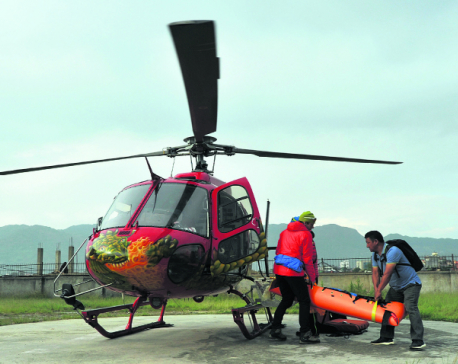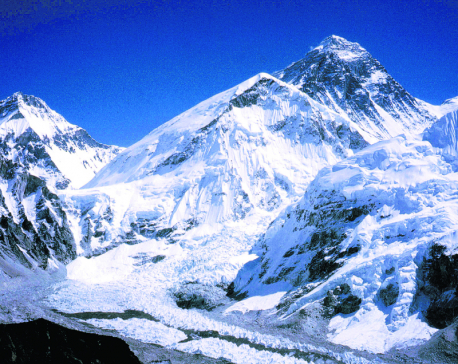
OR
KATHMANDU, May 1: Swiss climber Ueli Steck famed for his relentless mountaineering feats perished on Everest during a mountaineering accident early morning on Sunday. He was 40.
Steck, whose accomplishments earned him the nickname 'the Swiss Machine', died after skidding off about 1,000 meters down nearby Everest base camp-2, confirmed Durga Datta Dhakal, spokesperson of the Department of Tourism.
The department informed that the Swiss climber this year had taken permit to climb Mt Everest and Mt Nuptse, a smaller peak in the area. “Unfortunately, he slipped while en route to Nuptse at around 6 am,” informed Dhakal. The accident site is the meeting point of Lhotse, Nuptse and Everest.
His expedition was organized by Kathmandu-based Seven Summits Treks Pvt, Ltd. He is the first casualty in this year's mountaineering season in Nepal, which began in March.
Steck's body has been recovered from the incident site and airlifted to Kathmandu on Sunday.
Hundreds of condolence messages poured in after the death of the Swiss. “This is a truly tragic day in mountaineering,” wrote Alan Arnette, a renowned summit coach and Everest summiter.
Arguably known as one of the most feted mountaineers of his generation, Steck's impressive achievements include scaling Everest (8,848 meters) without oxygen, achieving the first solo climb of Mt Annapurna (8,091 meters), speed ascents of iconic Alpine routes, as well as scaling all 82 Alpine peaks higher than 4,000 meters in 2015.
For the impressive feats that he achieved, Steck won the Piolet d'Or award (French for The Golden Ice Axe), which is considered as the 'Oscar of mountaineering' in 2014.
In 2013, he was also in limelight over an Everest incident that could possibly be the worlds' highest altitude brawl. That year on April 27, three foreign climbers including Steck, got involved in a violent confrontation with a group of Sherpa guides.
The row between them had started after the three ignored Sherpas' request not to climb the Everest until they had finished fixing the ropes above Camp-2 (6,400 meters) for guided expedition groups.
The dangerous brawl ceased without any causality, but the incident continued to be in discussions after both the sides continued blaming the other as the cause of the incident.
Since this year's Everest season started in May, 51 groups of climbers are attempting to scale the world's tallest peak, according to Department of Tourism
You May Like This

Acclaimed Swiss climber dies near Everest
KATHMANDU, April 30:Swiss climber Ueli Steck famed for his relentless mountaineering feats perished near Mt Everest during a mountaineering accident... Read More...

American climber dies on Everest, Indian missing
KATHMANDU, May 21: An American climber on Mount Everest died on Sunday, officials said, the third death on the world's highest... Read More...

Famed Swiss climber Ueli Steck killed near Mount Everest
KATHMANDU, April 30: Expedition organizers say famed Swiss climber Ueli Steck was killed in a mountaineering accident near Mount Everest... Read More...










Just In
- MoPIT prepares draft of National Road Safety Act, proposes rescue within an hour of an accident
- Light rainfall likely in hilly areas of Koshi, Bagmati, Gandaki and Karnali provinces
- Customs revenue collection surpasses target at Tatopani border, Falls behind at Rasuwagadhi border in Q3
- Rain shocks: On the monsoon in 2024
- Govt receives 1,658 proposals for startup loans; Minimum of 50 points required for eligibility
- Unified Socialist leader Sodari appointed Sudurpaschim CM
- One Nepali dies in UAE flood
- Madhesh Province CM Yadav expands cabinet









Leave A Comment